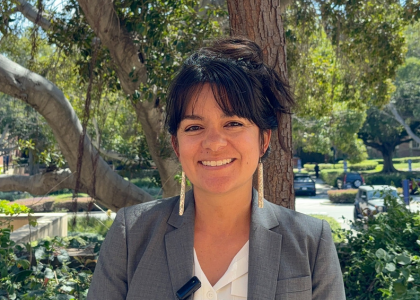Lauren van Schilfgaarde explores the role of tribal lay advocates in expanding access to justice

Lauren van Schilfgaarde ’12, assistant professor of law, assistant director of the Native Nations Law and Policy Center, and expert in tribal sovereignty and federal Indian law, has spent years studying how tribal courts integrate traditional practices with modern legal systems. Her latest research examines how tribal communities are expanding access to justice through lay advocates - non-lawyer representatives who bring unique cultural knowledge and community connections to tribal courts.
Her findings, which appear as a chapter in the forthcoming book, Rethinking the Lawyers’ Monopoly, Access to Justice, argues that tribal courts offer valuable lessons for addressing broader access to justice challenges across America's legal system.
In this edited conversation, van Schilfgaarde discusses how tribal courts are reimagining legal representation, challenging conventional wisdom about who can provide effective advocacy, and demonstrating how Indigenous legal traditions can inform modern justice systems.
You've recently contributed to an upcoming book on rethinking legal representation. What was your focus?
My contribution is a chapter titled, "The Statutory Influence of Tribal Lay Advocates," for the forthcoming book, Rethinking the Lawyers' Monopoly, Access to Justice. I examine how tribal courts incorporate both licensed attorneys and lay advocates in their legal systems.
Many people might not be familiar with tribal courts. How would you describe them?
Tribal courts are incredibly dynamic. In many ways, they look very familiar to state and local courts, but they're also uniquely innovative, especially regarding legal representation. They're doing groundbreaking work that combines familiar legal structures with approaches that reflect their specific communities and traditions.
What role do tribal codes play in this innovation?
Tribal codes reflect innovations happening within these communities. Tribes are experimenting with new approaches while simultaneously drawing on ancient traditions to advance justice in ways that are meaningful to their particular communities. The codes formalize these approaches, creating systems that honor both innovation and tradition.
Your research challenges some assumptions about legal representation. Could you elaborate?
When we typically think about access to justice, we often frame it as lawyer versus non-lawyer, assuming that lawyers bring qualifications that lay advocates simply lack. The conventional wisdom suggests we're sacrificing those qualifications when considering lay advocate representation.
But my research shows that's not necessarily the case. When tribes codify the possibility for lay advocates, they're actually prioritizing unique strengths these advocates bring to the table that lawyers might not have — including access to tribal custom and tradition, connections to the community, and accountability to that community. In some instances, a lay advocate might actually be preferable to an attorney.
Why is this perspective important beyond tribal contexts?
This approach is critically important when thinking about access to justice, not just for tribes but in a more global context. It invites us to reconsider what qualifications and connections matter most in different legal settings and for different communities.
Were there limitations to your research that you'd like readers to be aware of?
In this article, I looked exclusively at tribal codes that are currently publicly available, which is actually a narrow slice of what's happening with tribes. There are many codes I didn't see, as well as practices that aren't codified.
If nothing else, this research is a call to action. Tribes are doing incredible work that just isn't currently part of the scholarly conversation or the broader access to justice discussion. Tribes should be brought into these conversations both because they're an important component of the American justice system and because there are exciting lessons to be learned from their approaches.
Van Schilfgaarde’s chapter, "The Statutory Influence of Tribal Lay Advocates" appears in the forthcoming book Rethinking the Lawyers' Monopoly, Access to Justice, and examines how tribal courts incorporate both licensed attorneys and lay advocates in their legal systems.